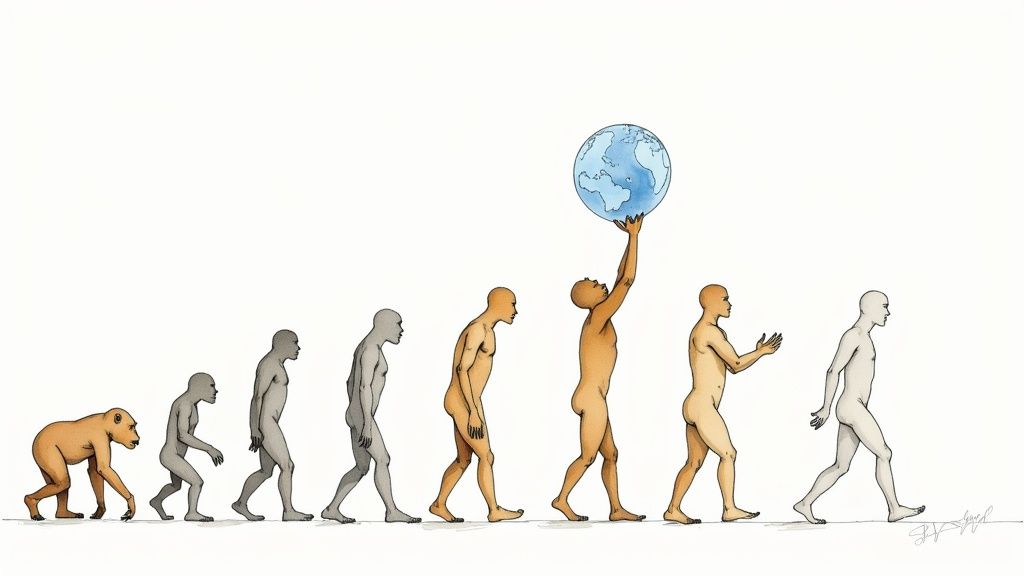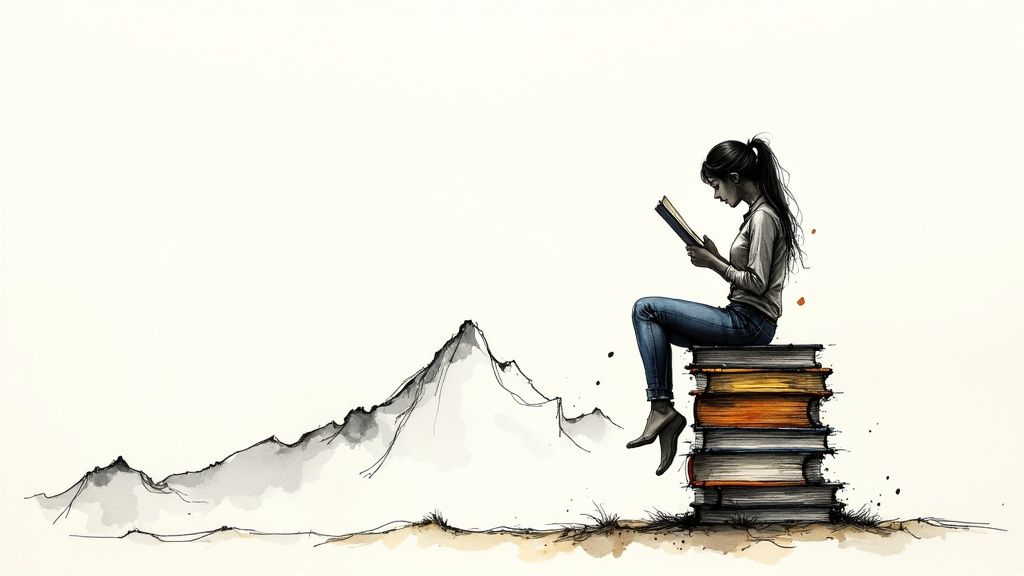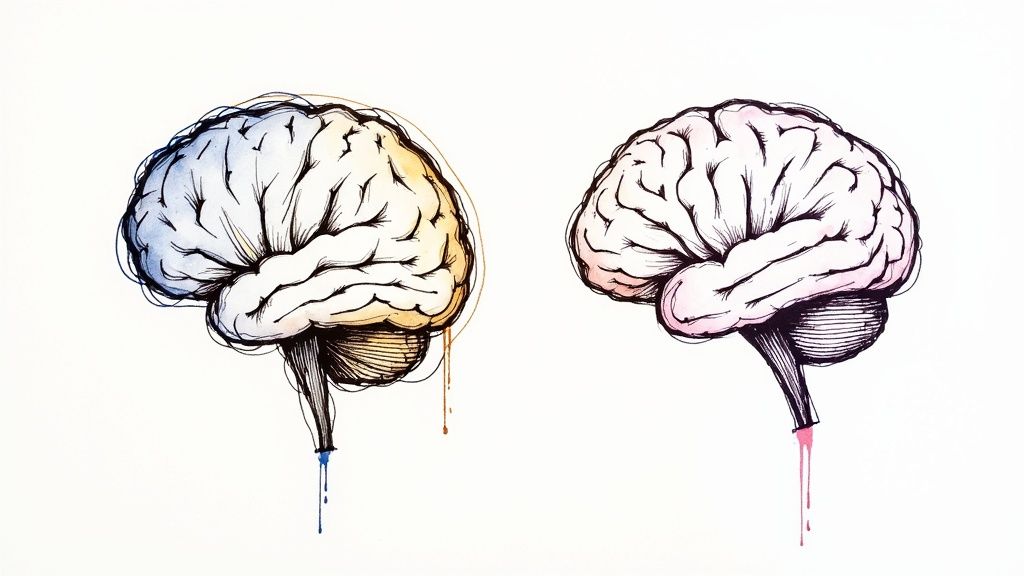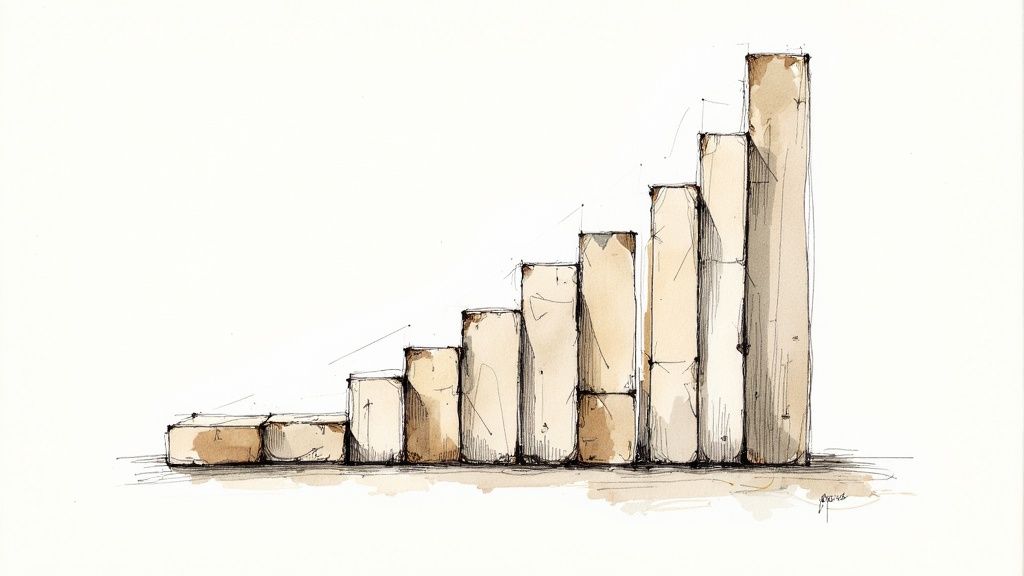In a world brimming with stories, the truest adventures often lie hidden in plain sight, within the pages of non-fiction. These books don't just entertain; they challenge, inform, and reshape our understanding of the universe and our place in it. For young readers, parents, and educators, finding the right title can feel like discovering a new continent of ideas, but knowing where to start can be daunting. This guide is your map.
We've curated a list of the best non fiction books to read, each a masterclass in its respective field. Spanning history, psychology, science, and memoir, these selections offer profound insights, actionable wisdom, and stories that prove reality is often more astonishing than fiction. Each entry provides a clear summary, target audience, and key takeaways to help you select the perfect book for yourself, your child, or your classroom.
To truly embark on this ultimate mental adventure and unlock deeper insights, consider how technology can enhance the experience. For instance, you can use digital tools to improve reading comprehension with text-to-speech, making complex topics more accessible and engaging. Get ready to expand your mind, challenge your assumptions, and discover your next favorite read from our definitive list.
1. Sapiens: A Brief History of Humankind by Yuval Noah Harari
Yuval Noah Harari’s Sapiens offers a breathtaking journey through 70,000 years of human history, from our humble origins as just one of several human species to our current status as the planet’s dominant life form. It is one of the best non fiction books to read for anyone seeking a grand, unified narrative of our past. The book is structured around three major transformations: the Cognitive, Agricultural, and Scientific Revolutions.

Harari argues that our ability to cooperate flexibly in large numbers, driven by our unique capacity for creating and believing in shared fictions like money, laws, and nations, is what set Homo sapiens apart. This core idea explains everything from the rise of empires to the interconnectedness of the modern global economy.
Why It's a Must-Read
Sapiens is essential for readers who want to understand the deep structures that shape our present-day societies. It provides a macro-level perspective that connects seemingly disparate historical events into a single, cohesive story.
- Subject Highlight: Anthropology, World History
- Target Age Range: 14+
- Key Takeaway: Our capacity to create and believe in shared myths (money, religion, nations) allowed for unprecedented large-scale cooperation.
To get the most from this book, consider keeping a notebook to track the cause-and-effect relationships between the three major revolutions Harari outlines. Discussing the concepts with others can also help you connect historical patterns to current events, such as global economic trends or political ideologies.
2. Educated by Tara Westover
Tara Westover's Educated is a gripping memoir detailing her extraordinary journey from a survivalist family in rural Idaho, where she never attended school, to earning a PhD from Cambridge University. It is one of the best non fiction books to read for its powerful exploration of family loyalty, the pursuit of knowledge, and the profound, often painful, process of self-invention. The narrative chronicles her struggle to reconcile her thirst for learning with the isolated, patriarchal world she was born into.

Westover’s story vividly illustrates how formal education can completely reshape a person’s worldview and identity. Her transformation highlights the immense challenges of breaking from deeply ingrained family beliefs and demonstrates the life-altering power that books and learning can hold for an individual seeking to understand the world on their own terms.
Why It's a Must-Read
Educated is essential for anyone interested in the transformative power of knowledge and the courage it takes to forge your own path. It provides a deeply personal and unforgettable account of escaping physical and psychological confines. Many find it to be an inspiring story, which you can learn more about in this list of books about women's rights on number6publishing.com.
- Subject Highlight: Memoir, Education, Family Dynamics
- Target Age Range: 16+
- Key Takeaway: Education can be a powerful tool for self-discovery and liberation, but it can also create a painful distance from one's origins.
To get the most from this book, be prepared for its emotionally intense content, which includes descriptions of family trauma. It is helpful to reflect on your own educational journey and consider how knowledge has shaped your personal identity. Discussing the book can illuminate the complex relationship between education, family, and selfhood.
3. Thinking, Fast and Slow by Daniel Kahneman
Nobel laureate Daniel Kahneman’s Thinking, Fast and Slow is a groundbreaking exploration of the two systems that shape human cognition. The book deconstructs our mental processes into System 1 (fast, intuitive, and emotional) and System 2 (slow, deliberate, and logical). It stands as one of the best non fiction books to read for anyone interested in understanding the hidden biases that influence our choices in everything from personal finance to daily life.

Kahneman masterfully uses relatable examples to reveal how our reliance on System 1's mental shortcuts leads to predictable errors in judgment. He explains concepts like the anchoring bias, where we over-rely on the first piece of information offered, and loss aversion, our tendency to feel the pain of a loss more acutely than the pleasure of an equivalent gain. Understanding these cognitive biases is the first step toward making more rational decisions.
Why It's a Must-Read
This book is essential for developing critical thinking by revealing the invisible machinery of your mind. It empowers you to question your own intuition and recognize when a more deliberate, analytical approach is necessary to avoid common mental traps.
- Subject Highlight: Psychology, Behavioral Economics
- Target Age Range: 16+
- Key Takeaway: Our minds are governed by two systems, and the unconscious biases of our fast, intuitive thinking (System 1) often lead to errors in judgment that can only be corrected by our slow, logical thinking (System 2).
To get the most from this book, read it in sections and pause to identify these biases in your own life and in the news. Keeping a journal of your observations can improve your decision-making processes. Applying these concepts also requires strong analytical abilities, so you may want to improve your reading comprehension skills to better digest Kahneman's dense but rewarding insights.
4. The Immortal Life of Henrietta Lacks by Rebecca Skloot
Rebecca Skloot’s The Immortal Life of Henrietta Lacks tells the powerful true story of a poor Southern tobacco farmer whose cells, taken without her knowledge in 1951, became one of medicine's most important tools. It is one of the best non fiction books to read for its seamless blend of science, biography, and ethics. The book masterfully weaves together Henrietta's personal story, her family's struggle for recognition, and the incredible scientific legacy of the "HeLa" cells.
Skloot details how HeLa cells were instrumental in developing the polio vaccine, advancing cancer research, and understanding the human genome. The narrative forces readers to confront complex questions about medical ethics, informed consent, and the racial inequities that have historically plagued scientific research.
Why It's a Must-Read
This book is essential for anyone interested in medical history, ethics, or social justice. It puts a human face on the abstract world of scientific discovery and highlights the profound contributions and sacrifices that often go unacknowledged.
- Subject Highlight: Medical Ethics, Social Justice, Science History
- Target Age Range: 15+
- Key Takeaway: Major scientific advancements can have complex and troubling ethical foundations, raising critical questions about consent and who benefits from medical progress.
To fully appreciate the book's impact, consider researching basic cell biology concepts beforehand. Reflect on the ethical implications of modern medical research and discuss issues of patient consent and exploitation in healthcare, both past and present.
5. Atomic Habits by James Clear
James Clear’s Atomic Habits offers a highly practical framework for improving every day, focusing on the power of small, incremental changes. It's one of the best non fiction books to read because it demystifies habit formation, making personal growth accessible to everyone. Clear argues that significant results come not from massive, sudden transformations but from the compound effect of hundreds of tiny habits.

The book introduces the Four Laws of Behavior Change: make it obvious, attractive, easy, and satisfying. This simple yet powerful model provides a step-by-step guide to building good habits and breaking bad ones. By focusing on systems rather than goals and shifting your identity, you create a foundation for lasting change.
Why It's a Must-Read
Atomic Habits is essential for anyone feeling stuck or overwhelmed by the idea of self-improvement. It provides clear, actionable strategies that can be implemented immediately, such as the 2-Minute Rule to overcome procrastination or habit stacking to integrate new behaviors into existing routines.
- Subject Highlight: Psychology, Self-Improvement
- Target Age Range: 14+
- Key Takeaway: Meaningful, long-term change is the product of tiny, consistent daily habits, not once-in-a-lifetime transformations.
To get the most from this book, choose just one small habit to focus on initially. Design your environment to make this habit as easy as possible and use a habit tracker to build momentum. Focusing on showing up consistently, even in a small way, is more important than achieving a perfect outcome every time.
6. Born a Crime: Stories from a South African Childhood by Trevor Noah
Trevor Noah’s Born a Crime is a powerful and deeply personal memoir about his upbringing in apartheid and post-apartheid South Africa. As the son of a white Swiss father and a Black Xhosa mother, Noah’s very existence was a crime, and his story offers a ground-level view of the absurdity and brutality of a system built on racial segregation. This is one of the best non fiction books to read for its unique blend of humor and poignant social commentary.
Through a series of compelling personal essays, Noah recounts his journey of navigating a world that refused to acknowledge him. He illustrates how language became his primary tool for survival, allowing him to connect with different racial and ethnic communities. The book is an extraordinary tribute to his mother, whose fierce love and resilience shaped his life.
Why It's a Must-Read
Born a Crime provides an accessible yet profound look at the mechanics of systemic racism and the human spirit's capacity to endure. It uses storytelling and wit to make complex historical and social issues deeply personal and understandable.
- Subject Highlight: Memoir, Social History, Resilience
- Target Age Range: 14+
- Key Takeaway: Humor can be a powerful tool for survival and for dismantling oppressive ideas, while resilience is often forged through love and determination.
To enrich your reading experience, take a moment to research the history of apartheid before you begin. As you read, pay close attention to the role language plays in shaping identity and community. This will help you appreciate how Noah uses his linguistic skills to navigate complex social landscapes and challenge racial boundaries.
7. The Body Keeps the Score by Bessel van der Kolk
Bessel van der Kolk’s The Body Keeps the Score is a foundational text that explores how trauma physically reshapes the brain and body. Drawing on decades of clinical experience and scientific research, van der Kolk explains that traumatic stress is not just an event from the past but a physiological imprint that continues to affect survivors’ nervous systems, emotional regulation, and physical health in the present. This is one of the best non fiction books to read for a deep, compassionate understanding of trauma’s lasting impact.
The book moves beyond traditional talk therapy, arguing that because trauma is held in the body, somatic or body-based therapies are essential for healing. It details innovative treatments like EMDR, yoga, neurofeedback, and theater, showing how they help survivors reconnect with their bodies and reclaim their lives. It's a crucial resource for anyone affected by trauma, as well as for mental health professionals.
Why It's a Must-Read
This book is essential for understanding that healing from trauma involves more than just cognitive processing; it requires addressing the body’s stored experiences. It offers hope and a clear path forward for those who have felt stuck or misunderstood in their recovery journey.
- Subject Highlight: Psychology, Neuroscience, Trauma Therapy
- Target Age Range: 16+ (due to mature themes)
- Key Takeaway: Traumatic experiences are stored in the body, and effective healing must include body-centered approaches to release this stored stress.
Given the book's intense subject matter, it is wise to take breaks while reading if you feel overwhelmed. For trauma survivors, reading with the guidance of a therapist can be beneficial. Use the book as a starting point to explore the recommended therapies with qualified professionals.
8. Quiet: The Power of Introverts in a World That Can't Stop Talking by Susan Cain
Susan Cain’s Quiet is a powerful exploration of introversion, challenging the long-held cultural belief that extroversion is the ideal personality type. It stands as one of the best non fiction books to read for anyone who has ever felt overwhelmed in a loud world. Cain blends compelling research with vivid storytelling to highlight how society dramatically undervalues introverts and their immense contributions.
The book argues that many of history's greatest achievements, from Steve Wozniak's creation of the first Apple computer to the quiet leadership of Rosa Parks, came from introverted individuals. Cain demonstrates that qualities like deep thinking, creativity, and careful consideration are often nurtured in solitude, proving essential for innovation and progress.
Why It's a Must-Read
Quiet provides validation for nearly half the population and offers extroverts crucial insights into their quieter counterparts. It’s essential for creating more inclusive and effective schools, workplaces, and social environments where all personality types can thrive.
- Subject Highlight: Psychology, Sociology, Self-Help
- Target Age Range: 15+
- Key Takeaway: Society has a cultural bias toward extroversion, but introverted qualities like thoughtfulness, persistence, and sensitivity are powerful and necessary for innovation.
To apply the book’s lessons, start by identifying your own tendencies on the introvert-extrovert spectrum. If you lean introverted, consciously create quiet spaces for yourself to recharge and do your best thinking. In group settings, practice advocating for your need for reflection before contributing. This book empowers you to understand and harness your natural strengths.
9. The Righteous Mind: Why Good People Are Divided by Politics and Religion by Jonathan Haidt
Social psychologist Jonathan Haidt’s The Righteous Mind is an eye-opening exploration into the roots of our moral judgments. He argues that our moral intuitions come first, and our strategic reasoning follows. This book is a landmark text for anyone wondering why political and religious divides seem so insurmountable, making it one of the best non fiction books to read for understanding modern discourse. Haidt introduces his Moral Foundations Theory, which proposes that our moral "taste buds" are tuned to six different foundations: Care/Harm, Fairness/Cheating, Loyalty/Betrayal, Authority/Subversion, Sanctity/Degradation, and Liberty/Oppression.
The book explains how different political groups, like liberals and conservatives, prioritize these foundations differently. For instance, liberals tend to focus heavily on the Care and Fairness foundations, while conservatives draw upon a broader range, including Loyalty, Authority, and Sanctity. This fundamental difference in moral palettes explains why each side can find the other’s views not just wrong, but incomprehensible or even immoral.
Why It's a Must-Read
The Righteous Mind equips readers with a powerful framework to understand political polarization and engage in more productive conversations. Instead of simply disagreeing, you learn to see the underlying moral reasoning that drives opposing viewpoints, fostering empathy and intellectual humility. By understanding these deep-seated psychological mechanisms, we can better navigate our own relationships and societal conflicts. To learn more about how psychology impacts our connections, explore these insightful books about love and relationships.
- Subject Highlight: Social Psychology, Political Science
- Target Age Range: 16+
- Key Takeaway: Moral judgments are primarily driven by intuition, not reason, and people's political leanings are strongly tied to which of the six moral foundations they prioritize.
To truly benefit from this book, try to identify your own primary moral foundations. When you encounter a political argument that seems baffling, use Haidt's framework to analyze which moral foundation the speaker is appealing to. This practice can transform frustrating debates into opportunities for deeper understanding.
10. Man's Search for Meaning by Viktor Frankl
Viktor Frankl’s Man's Search for Meaning is a profound and moving chronicle of his time as a prisoner in Nazi concentration camps. As both a survivor and a psychiatrist, Frankl offers a two-part analysis: first, a harrowing account of his experiences, and second, an introduction to his therapeutic philosophy, logotherapy. This book stands as a powerful testament to the human spirit's resilience and is one of the best non fiction books to read for anyone grappling with questions of purpose and suffering.
Frankl's central argument is that our primary drive in life is not pleasure, as Freud believed, or power, as Adler proposed, but the discovery and pursuit of what we personally find meaningful. He illustrates how, even in the most dehumanizing conditions imaginable, individuals could find a reason to live by choosing their attitude, finding purpose in love, or accepting their suffering with dignity.
Why It's a Must-Read
This book is essential for developing emotional resilience and a deeper understanding of human psychology. It provides a foundational framework for finding meaning not in spite of life's difficulties, but through them, by exercising the one freedom that can never be taken away: how we choose to respond.
- Subject Highlight: Psychology, Philosophy, Memoir
- Target Age Range: 16+
- Key Takeaway: We can survive almost any "how" if we have a "why"; meaning can be found in any circumstance, and it is our responsibility to find it.
To apply its lessons, try reflecting on what gives your own life a sense of purpose. When facing challenges, consciously practice choosing your attitude and focus on what you can control. This approach helps transform obstacles into opportunities for growth and strengthens your inner resolve.
Top 10 Nonfiction Books Comparison
| Title | Implementation Complexity 🔄 | Resource Requirements ⚡ | Expected Outcomes 📊 | Ideal Use Cases 💡 | Key Advantages ⭐ |
|---|---|---|---|---|---|
| Sapiens: A Brief History of Humankind | Moderate – broad interdisciplinary synthesis, accessible writing | Low – general reading, note-taking | High – broad understanding of human history and future | General readers, history enthusiasts | Fresh perspectives, accessible complex concepts |
| Educated | Low – straightforward memoir narrative | Low – personal reflection | High – inspiration, awareness of education’s transformative power | Memoirs lovers, education advocates | Emotional impact, personal growth insight |
| Thinking, Fast and Slow | High – dense academic content, detailed psychological concepts | Moderate – time for deep reading and reflection | Very High – improved decision-making and bias awareness | Psychology, economics, and decision-making fields | Scientifically rigorous, practical behavioral insights |
| The Immortal Life of Henrietta Lacks | Moderate – blends scientific info with storytelling | Low to moderate – some background knowledge helpful | High – awareness of medical ethics and research impact | Science readers, ethics learners | Combines ethics with compelling narrative |
| Atomic Habits | Low – practical and easy to implement advice | Low – consistent habit tracking | High – improved personal behavior and productivity | Self-improvement, productivity | Actionable science-backed strategies |
| Born a Crime | Low – personal, engaging memoir with humor and social commentary | Low – reading and contextual research | Moderate – insight into apartheid, resilience, and identity | Memoir readers, social justice advocates | Engaging humor, cultural education |
| The Body Keeps the Score | High – scientific and therapeutic detail | Moderate – careful reading, possible professional support | Very High – trauma understanding and recovery tools | Trauma survivors, mental health professionals | Integrates neuroscience with accessible treatment methods |
| Quiet: The Power of Introverts | Moderate – research-based with cultural critique | Low – general reading | Moderate – enhanced understanding of personality dynamics | Educators, workplace diversity, introverts | Validates introverts, challenges cultural biases |
| The Righteous Mind | Moderate – academic but readable moral psychology | Moderate – focused reading and reflection | High – improved understanding of political and moral divides | Political communication, conflict resolution | Framework for empathy, explains polarization |
| Man’s Search for Meaning | Low – concise philosophical memoir | Low – reflective reading | Very High – profound resilience and purpose insights | Psychology, existential studies | Inspirational, foundational psychological text |
Turn the Page: Your Next Chapter of Discovery Awaits
The journey through this curated selection of non-fiction is more than just a reading list; it is an invitation to explore the vast and intricate tapestry of the human experience. From the sweeping saga of our species in Sapiens to the intensely personal resilience detailed in Educated, each book serves as a powerful testament to the value of seeking truth and understanding. We have traveled from the microscopic world of Henrietta Lacks' immortal cells to the psychological depths of Viktor Frankl's search for meaning, uncovering profound insights along the way.
These are not merely books to be read and shelved. They are tools for life. The principles in Atomic Habits offer a practical blueprint for personal growth, while the research in Thinking, Fast and Slow equips us to make more conscious and rational decisions. The stories within Born a Crime and Quiet build bridges of empathy, helping us understand perspectives far different from our own and appreciate the quiet strengths we may possess. These titles are some of the best non fiction books to read because they empower you to actively engage with the world, not just observe it.
From Knowledge to Action: Your Next Steps
The true magic happens when the ideas within these pages leap into your daily life. The ultimate goal of reading great non-fiction is to transform information into wisdom and apply it in meaningful ways. Here’s how you can start that process today:
- Start a Discussion: Don't let these ideas stay on the page. Talk about them with friends, family, or in a book club. Discussing Jonathan Haidt’s theories on morality from The Righteous Mind or the societal implications from The Body Keeps the Score can deepen your understanding and reveal new perspectives.
- Journal Your Reflections: As you read, keep a notebook handy. Write down quotes that resonate, questions that arise, and connections you make to your own life. How does Daniel Kahneman's work change how you see your own thought processes? How does Tara Westover’s pursuit of education inspire your own goals?
- Pick One Actionable Idea: Choose one key takeaway from a book and commit to implementing it for a week. This could be a tiny habit from James Clear's framework or a conscious effort to listen more actively, inspired by Susan Cain. Small, consistent actions are the foundation of lasting change.
By actively engaging with these texts, you move beyond being a passive reader to become an active learner and a more informed, empathetic global citizen. The insights from these authors provide a foundation for building a more compassionate society, a more effective personal life, and a more profound connection to the stories that unite us all. Let this list be your launchpad into a lifelong adventure of discovery.
At Number 6 Publishing, we champion the power of story to connect, challenge, and inspire. We are dedicated to finding and publishing the heartfelt, diverse, and unconventional narratives that, much like the titles on this list, open new worlds for young readers, parents, and educators. Discover your next great read and explore our catalog of inclusive stories at Number 6 Publishing.
